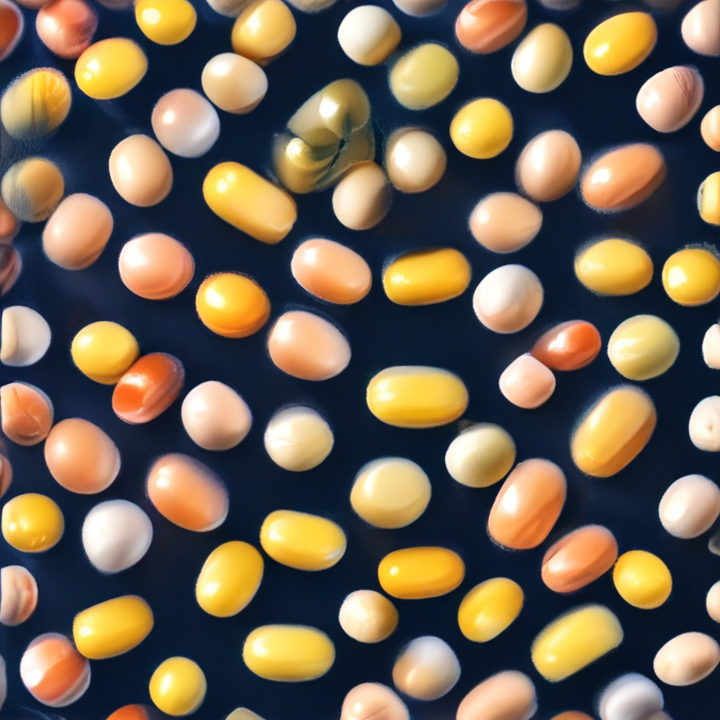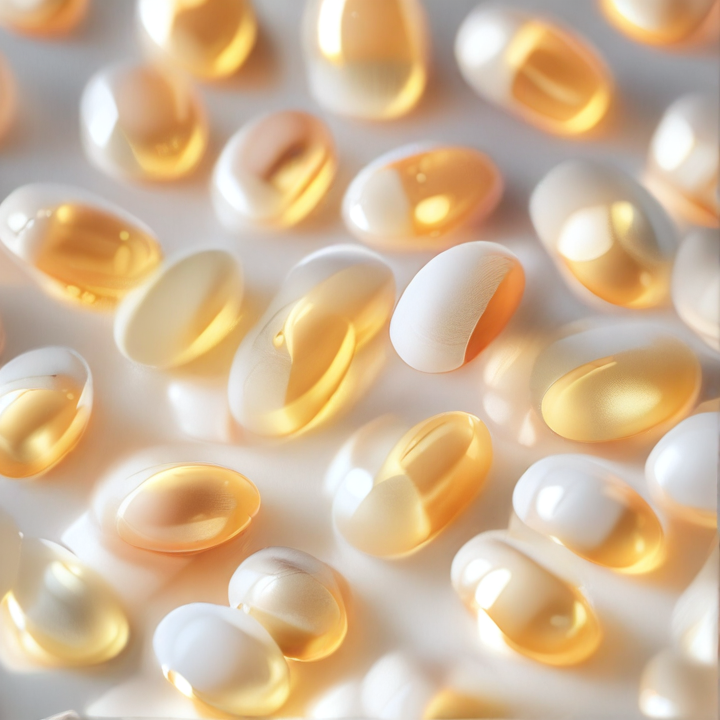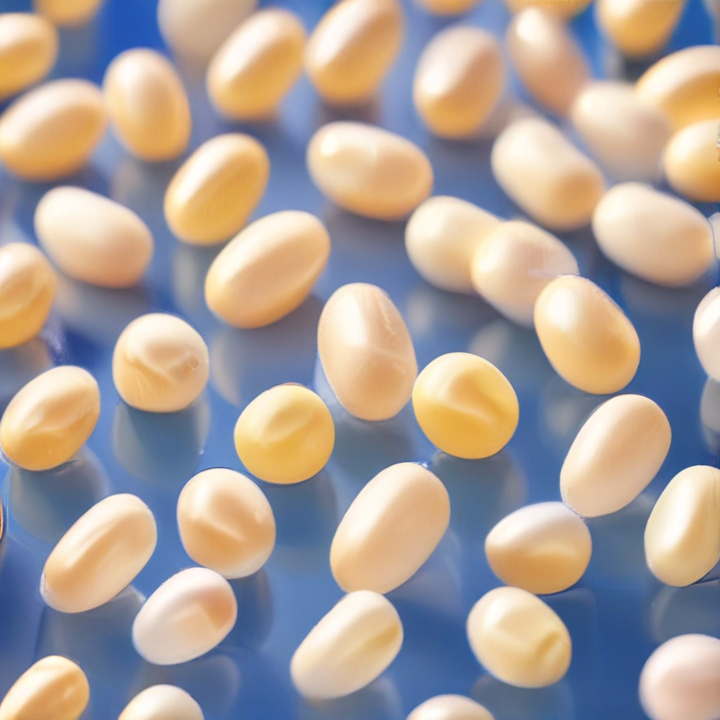vitamin d biotin Safety Certifications
When it comes to Vitamin D and Biotin supplements, safety certifications and adherence to quality standards are paramount for ensuring consumer safety. Here are key certifications and standards to look for:
1. GMP (Good Manufacturing Practices): Products that are GMP certified adhere to stringent quality control measures in manufacturing, ensuring consistency, purity, and potency.
2. USP (United States Pharmacopeia): USP sets quality standards for supplements, including verification of ingredients, product potency, and compliance with FDA standards.
3. NSF International: NSF certification indicates that the product has been independently tested and meets rigorous safety and quality requirements.
4. Non-GMO Project Verified: This certification ensures that the product does not contain genetically modified organisms, which is crucial for health-conscious consumers.
5. ISO 9001: Certification under ISO 9001 ensures that a manufacturer maintains an effective quality management system.
6. Allergen-Free Certifications: For those with sensitivities, allergen-free certifications (e.g., gluten-free, dairy-free) are essential to ensure the supplements don’t contain common allergens.
7. FDA Approval: While not a certification, products registered and compliant with the FDA’s guidelines suggest adherence to safety standards in the United States.
8. Kosher/Halal Certification: These ensure that the product meets dietary laws and is suitable for individuals following specific religious dietary guidelines.
Vitamin D is essential for bone health and immune function, while Biotin (Vitamin B7) is key for metabolic processes and improves hair, skin, and nail health. Despite their benefits, excessive intake can cause side effects. Therefore, choose supplements that are third-party tested and certified, ensuring they are free of harmful contaminants and meet safety regulations. Always consult healthcare providers before starting new supplements to tailor dosages to individual health needs.
List Reference Technical Parameters of “vitamin d biotin”
Vitamin D and biotin are two distinct nutrients, each with specific technical parameters crucial for understanding their roles and benefits.
Vitamin D:
1. Chemical Structure:
– Includes D2 (ergocalciferol) and D3 (cholecalciferol)
– Ergocalciferol (C28H44O)
– Cholecalciferol (C27H44O)
2. Molecular Weight:
– Vitamin D3: 384.64 g/mol
– Vitamin D2: 396.65 g/mol
3. Sources:
– D3: Sunlight, fatty fish, liver, cheese, egg yolk
– D2: Plant sources and fortified foods
4. Dosage:
– Recommended Daily Allowance (RDA): 600-800 IU (15-20 µg) for adults
– Upper Limit: 4000 IU (100 µg) per day
5. Bioavailability:
– Enhanced when taken with fatty meals
6. Function:
– Aids in calcium and phosphorus absorption
– Supports bone health, immune function, and inflammation regulation
7. Deficiency:
– Causes rickets in children, osteomalacia in adults
Biotin (Vitamin B7):
1. Chemical Structure:
– C10H16N2O3S
2. Molecular Weight:
– 244.31 g/mol
3. Sources:
– Egg yolk, liver, nuts, seeds, salmon, dairy, supplements
4. Dosage:
– Adequate Intake (AI): 30 µg/day for adults
– No established upper limit due to low toxicity
5. Bioavailability:
– Can be synthesized by gut microbiota to some extent
6. Function:
– Essential for carbohydrate, fat, and protein metabolism
– Maintains healthy hair, skin, and nails
– Supports neural function
7. Deficiency:
– Rare, but can cause skin rash, hair thinning, neurological symptoms
Both nutrients are crucial for maintaining overall health and wellness, with diverse biochemical roles and dietary sources. Regularly consuming a balanced diet usually provides sufficient quantities, though supplements may be necessary for individuals with specific deficiencies or higher needs.
List Product features of “vitamin d biotin”
Sure! Here are the key product features of “Vitamin D Biotin”:
1. Nutrient-Rich Formula:
– Combines Vitamin D and Biotin, essential vitamins that support various body functions.
2. Bone Health:
– Vitamin D is crucial for calcium absorption, promoting strong and healthy bones.
3. Skin, Hair, and Nails Support:
– Biotin, also known as Vitamin B7, supports cellular metabolism and is known for enhancing the health of skin, hair, and nails.
4. Immune System Boost:
– Vitamin D plays a vital role in strengthening the immune system, helping to ward off infections and illnesses.
5. Energy Production:
– Biotin aids in converting food into energy, ensuring you stay energized throughout the day.
6. Dosage Convenience:
– Available in easy-to-take pills, capsules, or gummies, making it simple to incorporate into your daily routine.
7. High-Quality Ingredients:
– Made using premium quality, non-GMO, and gluten-free ingredients to ensure purity and potency.
8. Supports Brain Health:
– Vitamin D is linked to cognitive function, contributing to overall brain health.
9. Heart Health:
– Maintains cardiovascular health by ensuring proper levels of calcium and phosphorus in the blood.
10. Hormone Regulation:
– Both vitamins play a role in hormone production and regulation, contributing to overall hormonal balance.
11. Metabolism Support:
– Biotin is essential for fat and carbohydrate metabolism, promoting healthy digestion and weight management.
12. Mood Stabilization:
– Vitamin D can help enhance mood and reduce symptoms of depression.
13. Suitable for Various Diets:
– Often compatible with vegetarian and vegan diets, depending on the formulation.
14. Verified and Tested:
– Typically third-party tested for quality assurance, ensuring you get a safe and effective product.
By combining the benefits of Vitamin D and Biotin, this supplement supports multiple aspects of health, making it a valuable addition to your wellness regimen.
List Various Types of “vitamin d biotin”
Certainly! Below are various types of supplements that combine Vitamin D and Biotin:
Capsules:
1. Standard Capsules: These typically contain a measured dose of Vitamin D (often as D2 or D3) and Biotin in a gelatin or vegetable-based shell. They are the most common form of combined supplements.
2. Softgels: Encapsulated in a gel solution for easier swallowing, these often enhance the absorption rates of the vitamins they contain.
Tablets:
1. Compressed Tablets: Made by compressing powders into a solid form, these are straightforward and convenient.
2. Effervescent Tablets: Designed to dissolve in water, providing a fizzy, palatable drink that ensures quick absorption of both vitamins.
Gummies:
1. Gelatin-Based Gummies: These are popular for their taste and ease of consumption, making them a favorite for those who dislike pills.
2. Pectin-Based Gummies: A good vegetarian or vegan alternative that uses pectin instead of gelatin as the gelling agent.
Liquids:
1. Liquid Drops: Typically administered with a dropper, which allows for flexible dosing, especially useful for children and those with swallowing difficulties.
2. Syrups: Flavored vitamin syrups that combine Vitamin D and Biotin, making it easy to mix with food or drink.
Powders:
1. Soluble Powders: Mixed with water or another beverage for easy intake. They are portable and can be adjusted for different dosages.
2. Protein or Nutrient Powders: Often combined with other vitamins, minerals, and protein, these powders cater to those looking for an all-in-one nutritional boost.
Specialty Forms:
1. Chewables: Easy to chew tablets or wafers, designed for those who have difficulty swallowing pills.
2. Slow-Release Formulations: Designed to release vitamins gradually over time, ensuring prolonged nutrient absorption.
These various forms accommodate different preferences and needs, making it easier to maintain the essential intake of both Vitamin D and Biotin. Always consult with healthcare professionals for recommendations tailored to individual health requirements.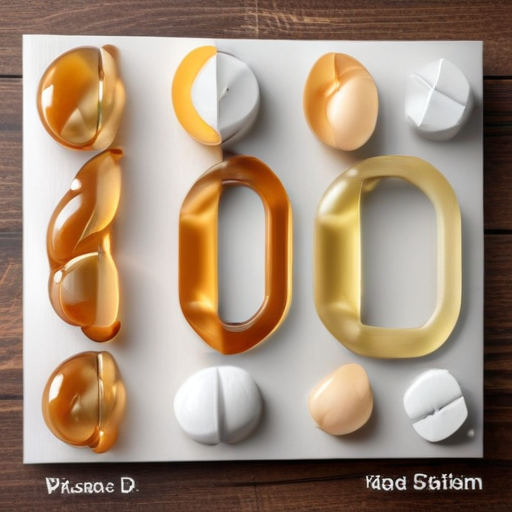
List Application of “vitamin d biotin”
Vitamin D and biotin are essential nutrients with distinct but complementary roles in maintaining health. Below are the primary applications of each:
Vitamin D
1. Bone Health: Vitamin D is critical for calcium absorption, essential in maintaining strong bones and teeth. It helps prevent rickets in children and osteomalacia or osteoporosis in adults.
2. Immune System: Supports the immune system by enhancing pathogen-fighting effects of monocytes and macrophages—white blood cells that are critical for immunity.
3. Muscle Function: Essential for muscle function, reducing the risk of falls, particularly in older adults.
4. Mood Regulation: Potential role in mood regulation and may help alleviate symptoms of depression.
5. Cardiovascular Health: May contribute to heart health by influencing blood pressure and calcium metabolism in the cardiovascular system.
6. Cancer Prevention: Some research suggests it may reduce the risk of certain cancers by regulating cell growth and communication.
Biotin (Vitamin B7)
1. Metabolism: Integral to metabolic processes, aiding the conversion of food into energy by supporting enzyme functions that metabolize fats, carbohydrates, and proteins.
2. Hair, Skin, and Nails: Promotes healthy hair, skin, and nails. Often included in beauty supplements for its role in maintaining healthy keratin infrastructure.
3. Nervous System: Supports nervous system health by assisting in neurotransmitter activity and the creation of fatty acids that protect nerves.
4. Pregnancy: Important during pregnancy for embryonic growth, particularly related to the development of the fetus’s nervous system.
5. Blood Sugar Regulation: Helps maintain blood sugar levels by facilitating glucose metabolism, which can be beneficial in managing diabetes.
6. Cardiovascular Support: Contributes to cardiovascular health by participating in lipid metabolism, potentially helping to manage cholesterol levels.
Combined Use
While vitamin D and biotin serve different primary functions, they can complement each other. For instance, their combined use may support overall metabolic health, strengthen the structural integrity of bones and hair, and provide comprehensive nutritional support.
Together, these vitamins play pivotal roles in diverse bodily functions, aiding in maintaining both aesthetic and foundational health aspects.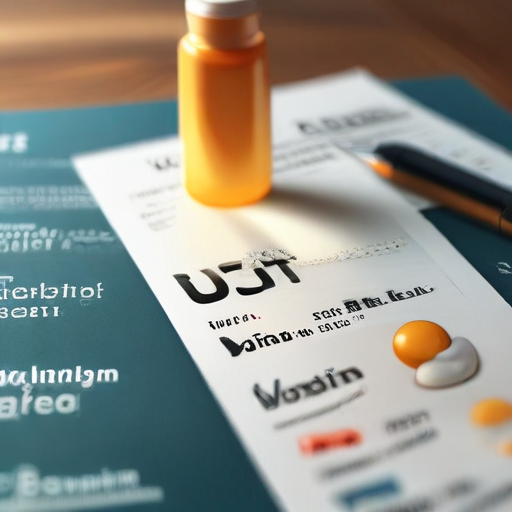
List Buyer Types of “vitamin d biotin”
Vitamin D and biotin are popular dietary supplements that cater to a range of buyer types, each driven by distinct health and wellness goals. Here’s a breakdown of the primary buyer types:
1. Health Enthusiasts: These individuals are generally well-informed about nutrition and wellness. They seek to enhance their overall health, energy levels, and immune function. Vitamin D is prized for its role in bone health and immune support, while biotin is valued for its benefits to hair, skin, and nail health.
2. Aging Population: Older adults often experience vitamin D deficiency due to reduced skin synthesis and dietary intake. This group is particularly interested in maintaining bone density and preventing osteoporosis. Biotin also appeals to them for its potential to combat age-related hair thinning and skin dryness.
3. Fitness Buffs and Athletes: Active individuals look for supplements that support muscle function, recovery, and overall physical performance. Vitamin D helps with muscle health and immune function, while biotin plays a role in energy metabolism, making this combination attractive.
4. Beauty and Personal Care Seekers: This group includes those focused on improving their aesthetic appeal. Biotin is widely marketed for its benefits in promoting healthier hair, stronger nails, and radiant skin, often combined with vitamin D to enhance these effects.
5. Parents and Caregivers: Concerned about their children’s and dependents’ overall health, this buyer type turns to vitamin D for bone development and immune support, while biotin is considered for maintaining healthy growth and development, especially concerning hair and skin health.
6. Individuals with Specific Health Conditions: People with conditions such as osteoporosis, brittle nail syndrome, or autoimmune disorders may be recommended vitamin D and biotin by their healthcare providers to manage symptoms and improve health outcomes.
7. Preventive Health Seekers: These buyers aim to prevent future health issues by maintaining adequate nutrient levels. They use vitamin D and biotin as part of a broader preventive health strategy to stave off deficiencies and related conditions.
By targeting these diverse buyer types, companies can effectively market vitamin D and biotin supplements to meet the specific needs and goals of different consumer segments.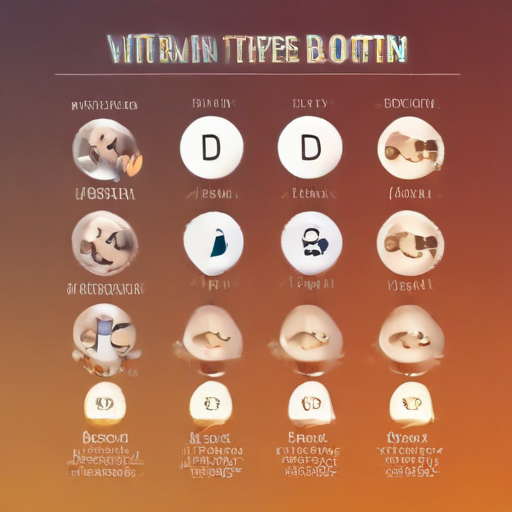
List “vitamin d biotin” Project Types for Different Industries
Here are potential project types involving Vitamin D and Biotin across various industries:
1. Healthcare & Pharmaceuticals
– Clinical Trials: Testing the efficacy of Vitamin D and Biotin supplements in treating specific deficiencies or conditions.
– Supplement Development: Creating new formulations that combine Vitamin D and Biotin for enhanced health benefits.
– Bioavailability Studies: Research projects focused on how well Vitamin D and Biotin are absorbed and utilized by the body.
2. Food and Beverage
– Fortified Food Products: Developing foods and beverages fortified with Vitamin D and Biotin to promote better nutritional intake.
– Product Marketing: Campaigns to market fortified products, emphasizing their health benefits.
– Taste and Stability Testing: Ensuring that adding Vitamin D and Biotin doesn’t adversely affect the taste, texture, or shelf life of food products.
3. Cosmetics and Personal Care
– Skincare Formulations: Developing creams, lotions, and serums that include Vitamin D and Biotin for their skin health benefits.
– Hair Care Products: Creating shampoos, conditioners, and treatments fortified with Vitamin D and Biotin to promote hair strength and growth.
– Consumer Testing: Conducting trials to gauge consumer response and efficacy of these products.
4. Agriculture and Animal Husbandry
– Animal Nutrition: Formulating animal feed that includes Vitamin D and Biotin to improve livestock health and productivity.
– Crop Fortification: Research on soil and crop treatments to enhance the natural content of Vitamin D and Biotin in plants.
– Veterinary Supplements: Developing Vitamin D and Biotin supplements for pets to support their overall wellbeing.
5. Education and Public Health
– Awareness Campaigns: Public health initiatives to educate about the benefits of Vitamin D and Biotin and encourage proper intake.
– Curriculum Development: Incorporating information about Vitamin D and Biotin into health and nutrition education programs.
– Survey Studies: Research projects to assess population-level deficiencies and design targeted interventions.
Each industry applies Vitamin D and Biotin in unique ways to address specific needs and opportunities.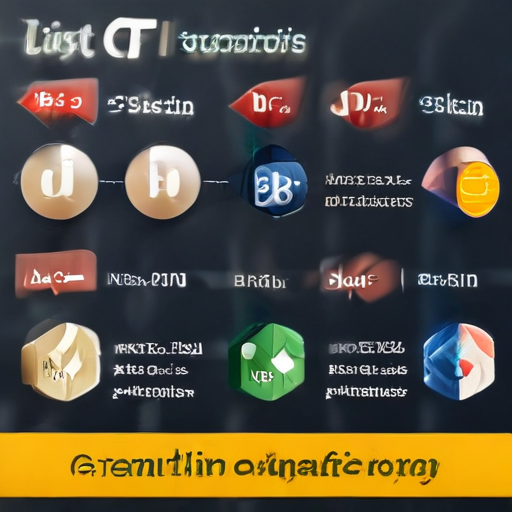
vitamin d biotin Accessories Upgrades and Custom Manufacturing Options
When it comes to vitamin D and biotin supplements, the market has seen an array of accessories, upgrades, and custom manufacturing options to cater to diverse consumer needs.
Accessories:
1. Pill Organizers: Advanced pill organizers with compartments labeled by day and time ensure that users adhere to their supplement schedules.
2. Portable Cases: Sleek, portable cases make it convenient to carry daily doses while traveling.
3. Smart Dispensers: These devices remind users when to take their supplements and track consumption using Bluetooth connectivity and smartphone apps.
Upgrades:
1. Enhanced Absorption: Formulations incorporating micellized or liposomal technology enhance the bioavailability of vitamin D and biotin, ensuring maximum absorption and efficacy.
2. Vegan Options: Plant-based alternatives to traditional gelatin capsules cater to vegan consumers and those with dietary restrictions.
3. Combination Supplements: Products that combine vitamin D with other vital nutrients like calcium or magnesium, and biotin with hair, skin, and nail-supporting ingredients, offer comprehensive health benefits in a single dose.
Custom Manufacturing Options:
1. Tailored Dosages: Custom manufacturing allows for dosage personalization based on individual health needs, age, and medical advice.
2. Flavor and Form: Options to create supplements in various forms such as gummies, chewables, liquids, and effervescent tablets, catering to different preferences.
3. Private Labeling: Businesses can opt for private labeling services, enabling them to market unique formulations under their brand.
4. Sustainable Packaging: Using eco-friendly materials for packaging caters to environmentally conscious consumers.
These innovations not only improve user experience and adherence but also enable brands to differentiate themselves in a competitive market.
List Quality Control and The Manufacturing Process of “vitamin d biotin”
Quality Control and Manufacturing Process of Vitamin D Biotin
Quality Control:
1. Raw Material Inspection: Both Vitamin D and Biotin raw materials undergo rigorous testing for purity, potency, and authenticity.
2. Supplier Qualification: Suppliers are audited and qualified based on their adherence to Good Manufacturing Practices (GMP).
3. In-Process Monitoring: Continuous monitoring during manufacturing ensures compliance with set specifications.
4. Microbial Testing: Ensures the absence of harmful microorganisms.
5. Heavy Metal Testing: Detects and quantifies potential contaminants like lead, mercury, and cadmium.
6. Stability Testing: Determines the shelf life under various conditions.
7. Final Product Testing: Ensures the final product meets all regulatory standards for potency, purity, and safety.
Manufacturing Process:
1. Pre-Mixing:
– Weighing and Measuring: Accurate quantities of Vitamin D and Biotin are weighed.
– Initial Blending: Ingredients are blended for homogeneity.
2. Mixing:
– Granulation: Dry or wet granulation processes are used for particle size uniformity.
– Drying: Wet granules are dried, often through air drying or fluid bed drying.
3. Sieving and Milling:
– Sieving removes oversized particles, and milling further refines particle size.
4. Blending:
– Final Blending: Ensures uniform distribution of active ingredients.
5. Formulation:
– Tabletting: The blend is compressed into tablets if producing solid forms.
– Encapsulation: Mix is encapsulated into capsules for easy consumption.
6. Coating:
– Tablets may be coated for protection, taste masking, and ease of swallowing.
7. Packaging:
– Filling and Sealing: Products are filled into bottles, blister packs, or pouches.
– Labeling: Accurate labels with batch numbers and expiry dates are affixed.
8. Quality Assurance:
– Final Inspection: Packed products are inspected for compliance with quality standards.
By adhering to these rigorous quality control measures and detailed manufacturing steps, manufacturers ensure that Vitamin D Biotin supplements are safe, effective, and of high quality.
How to use “vitamin d biotin”
Certainly! Vitamin D and biotin are important nutrients that play key roles in maintaining overall health. Here’s a concise guide on how to use them:
Vitamin D
Purpose: Vitamin D is essential for bone health, immune function, and overall wellbeing. It helps the body absorb calcium and phosphorus, crucial for bone strength.
Sources:
1. Sunlight: The body synthesizes Vitamin D when the skin is exposed to sunlight. Aim for about 10-30 minutes of midday sun several times a week.
2. Diet: Foods rich in Vitamin D include fatty fish (salmon, mackerel, sardines), egg yolks, fortified milk, and cereals.
3. Supplements: Available in two forms – D2 (ergocalciferol) and D3 (cholecalciferol). D3 is generally considered more effective.
Dosage:
– Adults (up to 70 years): 600-800 IU (International Units) daily
– Older adults (71+ years): 800 IU daily
Biotin
Purpose: Also known as Vitamin B7, biotin is vital for metabolism, skin health, hair growth, and nail strength.
Sources:
1. Diet: Foods rich in biotin include eggs, nuts (especially almonds), seeds, fish, and sweet potatoes.
2. Supplements: Biotin supplements are available in various forms, including tablets and gummies.
Dosage:
– Adults: The recommended daily allowance is around 30 micrograms, though higher doses (5,000-10,000 micrograms) are commonly found in supplements aimed at hair and skin health.
Important Tips
1. Consult a Healthcare Provider: Always check with a healthcare provider before starting any new supplement to understand the appropriate dosage for your specific health needs.
2. Consistency: For best results, take supplements consistently, following the product’s instructions.
3. Monitor Effects: Keep an eye on any changes in your health and report adverse effects to your healthcare provider.
By balancing natural sources with supplements, you can effectively incorporate Vitamin D and biotin into your daily routine to support overall health.
“vitamin d biotin” Comparative Analysis
Vitamin D and biotin are essential nutrients that play distinct and pivotal roles in maintaining overall health. This comparative analysis highlights the functions, sources, and health impacts of these two vitamins.
Function:
Vitamin D:
– Facilitates calcium and phosphorus absorption, promoting bone health.
– Enhances immune system efficiency.
– Regulates mood and wards off depression.
Biotin (Vitamin B7):
– Supports metabolic processes by aiding in the conversion of food into energy.
– Promotes healthy hair, skin, and nails.
– Involved in the synthesis of fatty acids and glucose.
Sources:
Vitamin D:
– Sunlight exposure facilitates the endogenous production of vitamin D.
– Dietary sources include fatty fish (salmon, mackerel), fortified dairy products, and egg yolks.
– Supplements are an alternative, especially in regions with limited sunlight.
Biotin:
– Found abundantly in foods like eggs, nuts, seeds, and organ meats.
– Also present in whole grains and some vegetables (spinach, broccoli).
– Biotin supplements can address deficiencies, though rarer than vitamin D deficiencies.
Health Impacts:
Vitamin D Deficiency:
– Leads to weakened bone structure, causing conditions like rickets in children and osteomalacia or osteoporosis in adults.
– Heightens susceptibility to infections and autoimmune diseases.
– May contribute to mood disorders such as depression.
Biotin Deficiency:
– Although rare, can result in hair loss, skin rashes, and brittle nails.
– Neurological symptoms such as depression, lethargy, and hallucinations may occur in severe cases.
– Pregnant women are at higher risk, with deficiency potentially impacting fetal development.
Conclusion:
While both vitamin D and biotin are crucial for health, they serve different purposes. Vitamin D primarily supports bone health and immune function, while biotin is essential for metabolic efficiency and maintaining healthy hair, skin, and nails. Ensuring adequate intake of both through diet, supplementation, and lifestyle practices like sun exposure ensures balanced nutrition and helps prevent deficiencies that could lead to severe health issues.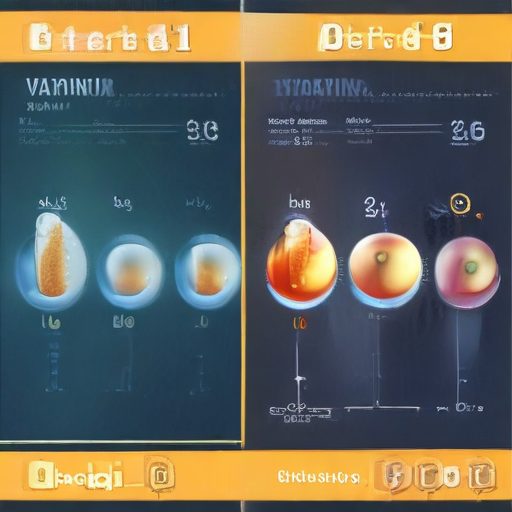
“vitamin d biotin” Warranty and Support
When it comes to Vitamin D and Biotin supplements, manufacturers typically offer a warranty and support to ensure customer satisfaction and product efficacy. Here’s what you can generally expect:
Warranty:
1. Money-Back Guarantee: Many reputable brands offer a 30- to 60-day money-back guarantee. If you are not satisfied with the results, you can return the product for a full refund within this period.
2. Product Quality Guarantee: Some companies assure that their supplements are made from high-quality, natural ingredients and free from harmful additives. They may also guarantee that their products are tested for purity and potency.
3. Damaged or Defective Products: In case you receive a damaged or defective product, most manufacturers will replace it free of charge. Typically, you need to contact customer service within a specified period (usually 14 days) after receiving the product.
Support:
1. Customer Service: Most companies offer robust customer service, available via email, phone, or live chat. You can contact them for inquiries about the product, dosage recommendations, or any issues you might encounter.
2. Frequently Asked Questions (FAQs): Websites often feature a comprehensive FAQ section where you can find answers to common questions about usage, benefits, and potential side effects of Vitamin D and Biotin supplements.
3. Health Advisory: Some manufacturers provide access to certified health advisors or pharmacists who can offer personalized advice on how to best use their products in conjunction with your health goals.
4. Subscription Services: To ensure you never run out of your supplements, many companies offer subscription services. These services often come with additional customer support and discounted pricing.
Always read the warranty and support information carefully before making a purchase to ensure that you are fully covered and know how to get assistance if needed.
List “vitamin d biotin” FAQ
Vitamin D and Biotin FAQs
1. What are Vitamin D and Biotin?
– Vitamin D: A fat-soluble vitamin essential for calcium absorption, bone health, and immune function.
– Biotin (Vitamin B7): A water-soluble vitamin vital for metabolic processes, including the synthesis of fatty acids and glucose, and supports hair, skin, and nail health.
2. How do I obtain these nutrients?
– Vitamin D: Sun exposure, fortified foods (milk, cereal), fatty fish (salmon, mackerel), and supplements.
– Biotin: Found in foods like eggs, nuts, seeds, spinach, and supplements.
3. What are the benefits?
– Vitamin D: Promotes bone health, supports the immune system, and may improve mood.
– Biotin: Encourages healthy hair, skin, nails, and supports metabolism.
4. What are the symptoms of deficiency?
– Vitamin D Deficiency: Bone pain, muscle weakness, increased risk of fractures, and immune system impairment.
– Biotin Deficiency: Hair loss, brittle nails, skin rash, fatigue, and neurological symptoms.
5. How much do I need daily?
– Vitamin D: Generally, 600-800 IU for most adults, but requirements can vary.
– Biotin: The recommended dose is around 30 micrograms daily for adults.
6. Can I take them together?
– Yes, Vitamin D and biotin can be taken together as there are no known adverse interactions.
7. Are there side effects of taking too much?
– Vitamin D Overdose: Can cause hypercalcemia, leading to nausea, weakness, and kidney complications.
– Biotin Overdose: Generally considered safe, but very high doses might interfere with lab test results.
8. Are supplements necessary?
– Supplements can be useful if dietary intake or sun exposure is insufficient, but consult a healthcare provider before starting.
9. Can I get these nutrients naturally?
– Yes, through a balanced diet and adequate sun exposure, but supplementation may be necessary for some individuals.
Note:
Always consult with a healthcare provider for personalized advice and before starting any new supplement regimen.
Top 10 FAQ with answer about vitamin d biotin for Buyer Sourcing from China
Certainly! Here’s a concise guide to the top 10 frequently asked questions (FAQs) about sourcing Vitamin D and Biotin from China:
1. What certifications should I look for in a manufacturer?
– Ensure the manufacturer has GMP, ISO, and possibly NSF certifications. These indicate adherence to global manufacturing standards.
2. Are there quality control measures in place?
– Reputable suppliers should have robust quality control systems, including third-party testing and Certificates of Analysis (COA) for each batch.
3. Can I request samples before making a bulk order?
– Yes, most manufacturers can provide samples upon request. This allows you to verify the product quality before committing to a large purchase.
4. What is the minimum order quantity (MOQ)?
– MOQs can vary significantly but typically range from 1000 to 5000 units. Negotiating terms based on your volume requirements is recommended.
5. What is the lead time for production and delivery?
– Lead times can range from 2-6 weeks depending on order size and complexity. Shipping times are additional and depend on the logistics method selected.
6. Are the ingredients sourced sustainably?
– Confirm if vendors have sustainable sourcing policies. Manufacturers should ideally source raw materials that are non-GMO and sustainably harvested.
7. Can the manufacturer customize formulations or packaging?
– Many suppliers offer customization options. If specific formulations or private labeling are required, inquire about these services upfront.
8. What is the cost structure?
– Understand the pricing model, including any hidden fees such as customs duties, quality testing fees, or packaging costs.
9. How is product traceability managed?
– Your supplier should have a traceability system to track each product batch back to its production details, ensuring transparency and accountability.
10. What are the payment terms?
– Common payment terms include T/T (Telegraphic Transfer), L/C (Letter of Credit), or even favorable terms for long-term partnerships. It’s crucial to align on these terms before placing an order.
These FAQs should guide you in making informed decisions when sourcing Vitamin D and Biotin from China, ensuring quality, compliance, and efficiency in your supply chain.

